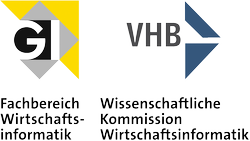Track 1: Individualization and Consumerization
Innovations in Consumer IT such as SmartPhones, App Markets, Car IT, or interactive websites via the laptop or mobile devices have changed for many people their everyday live and the way they use IT. New service experiences (joy of use, ease of use, etc.), new ways of collaboration (mobile, context sensitive, etc.) and new value propositions have changed user expectations for IT and services in many other fields, driving service-dominant logic and consequently the customer expectations for personalized services to many new areas. Service innovations, new ways of service creation, orchestration and consumption, using and creating vast amounts of openly available or user-generated data offer great potential for improving everyday life of large parts of our society. New business models and ways of value creation become critical, as a big opportunity, but also as a challenge for organizations and existing IT structures. Consumerization describes the tendency for new information technology to emerge first in the consumer market and then spread into business and government organizations. The emergence of consumer markets as the primary driver of information technology innovation is seen as a major IT industry shift, challenging the way companies innovate and evolve with IT.
This track addresses all aspects of personalization and consumerization of IT and welcomes all methodological approaches to the topics. We call for high quality papers on all aspects of iConsumer - personalisation and consumerization of IT. Possible topics include (but are not limited to):
(The track is supported by Fachgruppe CSCW of the Gesellschaft für Informatik (www.fgcscw.gi-ev.de). Authors of successful submissions will be offered the possibility to fast track an extended and revised version of their papers to a special issue of Electronic Markets.)
Topics
Life situations (Health, Shopping, Communication, Media, Housing, Mobility, Administration, Government)
Application and services for consumers (Mobile /internet based consumer solutions, Services and solutions supporting special circumstances / customer processes, Legal issues, Adoption & diffusion, Crowdsourcing through consumer communities)
Service innovation (Open Innovation with consumer, Open Data, Open Value Creation)
Consumer technologies
Methods, models & tools for designing and developing consumer services (Usability Engineering and user-centered design, Management of consumer data)
Entrepreneurship, business and service models for consumer solutions
Consumerization and Corporate IT (Managing consumerization, Antecedents and Effects of consumerization)
Applications for employees (Bring-your-own-device, Field service applications, Consumer consulting applications, Productivity tools, Inter and intra enterprise collaboration)
Consumer technologies (e.g. smart home, human-computer interaction, virtual worlds, online communities, web 2.0)
Track Chairs
Prof. Dr. Jan Marco Leimeister, University Kassel, Germany
Prof. Dr. Hubert Österle, University St. Gallen, Switzerland
Program Committee
Prof. Dr. Alexander Benlian, Technical University Darmstadt, Germany
Prof. Dr. Markus Bick, ESCP Berlin, Germany
Prof. Dr. Tilo Böhmann, University Hamburg, Germany
Dr. Ulrich Bretschneider, University Kassel, Germany
Dr. Angelika Bullinger-Hoffmann, FAU Erlangen Nürnberg, Germany
Prof. Dr. Thomas Hess, LMU München, Germany
Dr. Holger Hoffmann, University Kassel, Germany
Prof. Dr. Michael Koch, Universität der Bundeswehr München, Germany
Prof. Dr. Stephan Lukosch, Delft University, Netherlands
Prof. Dr. Wolfgang Maass, University Saarland, Germany
PD. Dr. Dr. Björn Niehaves, University Münster, Germany
Prof. Dr. Frank Piller, RWTH Aachen, Germany
Dr. Michael Schermann, Technische Universität München, Germany
Prof. Dr. Gerhard Schwabe, University Zurich, Switzerland
Prof. Dr. Ali Sunyaev, University Cologne, Germany
Prof. Dr. Frédéric Thiesse, University Würzburg, Germany














